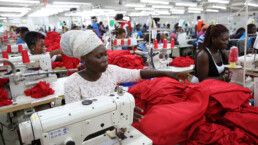The overall decline in access to secondary and tertiary education and the low prospects of finding alternative employment in the declining formal sector in developing countries, has created the need for non-formal education, with particular regard to rural and marginalised communities. The general notion concerning non-formal education over the years however has been that it is only adequate for maintaining the poor as members of a larger system, and preparing them for low level employment. Thus, non-formal educational programmes such as technical and vocational education, agricultural extension programmes and adult literacy programmes are generally looked down upon and considered secondary to formal education. Additionally, the lack of access to good jobs after non-formal education, has made it a lower priority for most national governments. Non-formal education however is very critical for the economic empowerment of the rural poor and can serve as an additional means of achieving Education For All (EFA), especially in Sub-Saharan Africa.
WHY NON-FORMAL EDUCATION?
Progressively, the world is acknowledging that formal schooling by itself cannot deliver meaningful basic Education For All. Though substantial advancement has been made toward achieving Education For All (EFA) since the World Education Forum in 2000, as at 2011, there were still more than 57 million out-of-school children of primary age worldwide. Moreover, another set of over 69 million young adolescents were not attending primary or secondary school, due to disadvantages such as poverty, rural location, gender bias, disability and social discrimination. Out of these numbers, Sub-Sahara Africa has one of the highest rates of out-of-school-children, with the majority being girls. One of the main problems is that the existing structure of formal education is not all-inclusive and thus consistently excludes some groups of children, particularly those who live in poverty or in rural areas. The social, cultural and economic context in which such children find themselves often necessitates that girls stay at home to help out with house chores while boys engage in non-formal work activities such as farming, fishing, weaving, etc. to help make a living for their families. To uphold the right to education of such children who cannot access formal education for these reasons, it is necessary to make consistent and varied forms of provision for education available, to meet the specific learning and time needs of such children and to promote lifelong learning, particularly in light of the increasing revolution in learning, technology and the digitization of work and industry.
In this regard, non-formal education is a major means of learning which can be innovatively exploited, especially in Sub-Saharan Africa. Non-formal education refers to educational activities which are organized outside of the framework of the formal system, purposely tailored for, and geared toward the provision of specific learning to particular groups of the population, both adults and children. The flexibility of non-formal education and its ability to be personalised to meet the context-specific learning needs of both adults and children, who have been excluded from the formal educational system makes non-formal education cardinal as a means of expanding the capabilities that will be of value to such people. Flexibility is particularly important because the rigid structure of formal education makes it difficult for it to meet the immediate work needs of such communities of people and hence, most, either do not go to school at all or drop out. In this regard, non-formal education, more than formal can better meet the skill needs of their specific social and economic context to enable them to find decent work and live decent livelihoods.
In light of these dynamics, education provided by one type of school, particularly the formal schooling system may not be suitable or accessible for all children, because some children will have different educational needs, and formal education is so structured that it is often unable to meet these needs. Non-formal education on the other hand can be adjusted to meet the specific time, skill and work needs of these individuals. This makes non-formal education as equally important as formal education and in some rural contexts, even more important for individual development and meeting larger societal development needs. Its flexible mode of delivery and provision enables marginalised rural children to study while supporting their families at home. A specific curriculum for non-formal education can be developed within the national educational framework, but the specifics of it should be informed and determined by the particular community being targeted.
For instance, in Sub-Saharan Africa, several interconnected factors prevent girls from entering or staying in school such as early marriage, pregnancy, poverty and cultural bias. Non-formal education can offer them a chance to continue education and reintegrate into formal education. In Gambia, the Re-Entry Programmes for Girls, initiated by the Ministry of Basic and Secondary Education, is one such programme which targets girls who have dropped out of school due to social, financial or other reasons, and it has proved largely successful in equipping these girls with skills with which to make a living. The Escuela Nueva model of non-formal education in Colombia is widely recognised for its success in meeting the learning needs of rural children through a multi-grade school model. The framework of such models can be adapted and up-scaled in Sub-Saharan Africa to address the perennial problem of out-of-school children in order to meet the goal of Education For All.
Non-formal education is indispensable to realising the right to quality and useful education for all out-of-school children and adolescents. Its innovation in curricula, pedagogy, and delivery modes, can also have a positive impact on formal education to prevent dropouts and improve education quality. Hence, the negative perception held by policy-makers, practitioners and development partners, of non-formal education as inferior or secondary to formal education must be changed. Such education can help promote personalised learning and provide the specific needs of targeted population groups. Non-formal education is thus a suitable alternative or in some cases, complements formal education especially for out of school children, rural children and children facing peculiar situations in Sub-Saharan Africa which make the formal educational system unsuitable for them.
The views expressed in this article are those of the author alone and not the Future Africa Forum.
The views expressed in this article are those of the author and do not necessarily reflect the views of Future Africa Forum. Future Africa Forum is a pan-African policy think-tank and policy advisory consultancy headquartered in Nairobi, Kenya.



